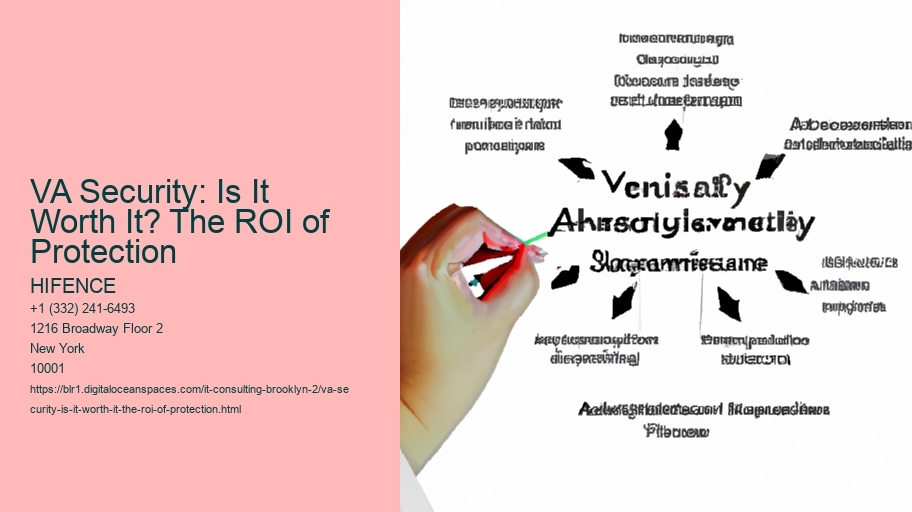Understanding the Landscape: Key VA Security Threats
Understanding the Landscape: Key VA Security Threats
When we talk about whether investing in security measures for the Department of Veterans Affairs (VA) is worth it, were not just talking about dollars and cents. Were talking about protecting the sensitive information and well-being of our veterans. To even begin to assess the "Return on Investment" (ROI) of VA security, we need to first thoroughly understand the landscape of threats they face.
What exactly are we up against? Its a complex picture. Think of it like this: the VA is a massive organization (a huge target, frankly) holding incredibly valuable data – medical records, financial information, personal details – all ripe for exploitation. This makes it a prime target for a variety of bad actors.
One major threat is cyberattacks. These range from relatively simple phishing attempts (those dodgy emails trying to trick people into giving up their passwords) to sophisticated ransomware attacks (where hackers lock down systems and demand payment to unlock them). Imagine the chaos if a hospital systems records were held hostage!
Then there are insider threats.
VA Security: Is It Worth It? The ROI of Protection - check
- managed it security services provider
- managed it security services provider
- managed it security services provider
- managed it security services provider
- managed it security services provider
- managed it security services provider
- managed it security services provider
- managed it security services provider
- managed it security services provider
- managed it security services provider
- managed it security services provider
VA Security: Is It Worth It? The ROI of Protection - managed services new york city
- managed services new york city
- managed service new york
- check
- managed services new york city
Beyond cyber threats, physical security breaches are also a concern. Unauthorized access to facilities or theft of equipment containing sensitive information could have devastating consequences. (Think about the impact of stolen laptops with unencrypted veteran data.)
Finally, we cant forget the evolving threat landscape. Hackers are constantly developing new and more sophisticated methods. What worked yesterday might not work tomorrow. (Staying ahead of the curve requires constant vigilance and adaptation.)
So, before we even start crunching numbers for ROI, understanding these diverse and ever-present threats forms the foundation for a rational discussion about the true value – the inherent worth – of protecting our veterans and their information. Without a clear picture of the landscape, any attempt to calculate the ROI of VA security is ultimately incomplete and, frankly, irresponsible.

Quantifying the Costs of a VA Data Breach
Quantifying the Costs of a VA Data Breach: Is It Worth It?
VA Security: Is It Worth It? The ROI of Protection - managed services new york city
- check
- check
- check
- check
- check
- check
- check
- check
- check
- check
- check
- check
When we talk about protecting veterans data at the VA, its easy to get lost in technical jargon and security protocols. But at its heart, its about safeguarding sensitive information entrusted to the government – information that can profoundly impact lives if compromised. So, how do we decide how much security is "enough"? This is where quantifying the costs of a potential data breach becomes crucial. (Think of it as figuring out how much an umbrella is worth before it starts raining.)
Its not just about the money, although thats a huge part of it. A VA data breach can trigger a cascade of expenses. Theres the immediate cost of investigating the breach itself: hiring forensics experts, notifying affected veterans (which can be in the millions), and implementing damage control measures. (Imagine the overtime pay!). Then there are the legal fees if class-action lawsuits arise, which are almost inevitable these days.
Beyond the direct financial impact, theres the harder-to-calculate, but equally devastating, cost of reputational damage. A data breach erodes trust. If veterans lose faith in the VAs ability to protect their information, they may be less willing to seek care, share critical details about their health, or engage with the system at all. This can have serious consequences for their well-being and the VAs mission. (Trust is like glass; once broken, its hard to put back together.)
Furthermore, a data breach can lead to identity theft, financial fraud, and emotional distress for veterans. Imagine the stress of dealing with fraudulent credit card charges, having your medical records exposed, or constantly worrying about your personal information being used against you. These are very real consequences that must be factored into the cost equation. (These are not just numbers; these are our veterans.)
By carefully quantifying all these tangible and intangible costs – the direct expenses, the reputational damage, and the impact on veterans – we can start to understand the true potential cost of a data breach. This, in turn, allows us to make informed decisions about investing in robust security measures. Ultimately, its about weighing the cost of protection against the cost of a potential disaster. (It always comes down to ROI: Return On Investment.) Its a complex calculation, but one thats essential to fulfilling our responsibility to protect those who served.
VA Security Measures: An Overview of Investments
VA Security Measures: An Overview of Investments for topic VA Security: Is It Worth It? The ROI of Protection

So, were talking about VA security, right? Is it worth the money? Thats the million-dollar question (or, probably, the multi-million-dollar question, given the scale were dealing with). Lets look at the investments themselves.
VA Security: Is It Worth It? The ROI of Protection - managed services new york city
- check
All of that costs a pretty penny. But whats the return on investment (ROI)? Well, think about the alternative. What happens if the VA doesnt invest in strong security? A major data breach could expose the sensitive medical records and personal information of millions of veterans. (Thats a PR nightmare, to say the least, and a violation of trust.) The cost of recovering from such a breach – notifying affected individuals, paying for credit monitoring, dealing with lawsuits, and repairing the damage to the VAs reputation – would be astronomical.
Furthermore, a successful cyberattack could disrupt VA services, impacting veterans access to healthcare, benefits, and other essential resources. (Imagine veterans unable to get their medications or schedule appointments.) The human cost of such a disruption is immeasurable.
So, while the upfront cost of VA security measures is substantial, its an investment in protecting veterans, safeguarding sensitive data, and ensuring the continuity of critical services. The ROI isnt just about dollars and cents; its about trust, peace of mind, and the well-being of those who served our country. Its difficult to quantify, but avoiding a catastrophic breach and maintaining veterans faith in the system is, arguably, priceless.
Measuring the Intangible Benefits of Strong VA Security
Okay, so were talking VA security – is it really worth all the time, effort, and money? A big part of answering that is figuring out how to measure the intangible benefits. These are the things you cant easily put a dollar sign on, but theyre still incredibly valuable (and often overlooked).
Think about it: if the VA has a major security breach, what happens? Beyond the immediate costs of fixing the problem (which are definitely tangible!), theres a huge hit to public trust. Veterans and their families need to feel confident that their sensitive information – medical records, benefits data, everything – is safe. A breach erodes that trust, and rebuilding it takes a long time and a lot of effort (potentially costing more in the long run through decreased program participation or negative publicity).
Then theres the impact on morale. VA employees want to work in a secure environment. Constant threats and breaches create stress and can lead to burnout (which directly affects productivity and retention, costing the VA in recruitment and training). A strong security posture actually fosters a sense of stability and confidence within the workforce, allowing them to focus on their primary mission: serving veterans.

We also have to consider the potential legal and regulatory ramifications of a data breach. The VA is subject to numerous compliance requirements (like HIPAA), and violations can result in hefty fines and penalties. Proactive security measures, even if they seem expensive upfront, can prevent these costly consequences down the line (saving money and protecting the VAs reputation).
So, while its hard to put a precise dollar figure on things like trust, morale, and avoided legal issues, theyre absolutely critical factors in the ROI calculation. Ignoring these intangible benefits paints an incomplete – and often misleading – picture of the true value of strong VA security. Its about more than just preventing immediate financial losses; its about safeguarding the VAs mission and ensuring it can continue to serve veterans effectively for years to come (essentially, its an investment in the future).
Calculating the ROI: A Practical Framework
Calculating the ROI: A Practical Framework for VA Security: Is It Worth It? The ROI of Protection
The question of whether to invest in virtual assistant (VA) security often boils down to a simple, yet complex, calculation: Is it worth it? Were not just talking about the cost of antivirus software or robust password managers (though those are important). Were discussing a holistic approach to protecting your sensitive information when entrusting it to a VA. Calculating the Return on Investment (ROI) in this area requires a practical framework that considers both the tangible and intangible benefits of a secure VA relationship.
First, lets acknowledge the potential costs of not investing in security. Think data breaches (which can lead to hefty fines and legal battles), intellectual property theft (devastating for businesses built on unique ideas), reputational damage (hard to quantify but incredibly impactful), and the plain old disruption caused by compromised accounts (lost productivity, stressful recovery efforts). Assigning a potential dollar value to these risks is crucial, even if it involves some educated guesswork based on industry averages and your specific vulnerabilities.
On the flip side, what are the benefits of investing in VA security?
VA Security: Is It Worth It? The ROI of Protection - managed service new york
- managed service new york
- check
- managed service new york
- check
- managed service new york
A practical framework for calculating the ROI might look something like this: estimate the potential cost of a security breach (considering legal fees, recovery costs, and reputational damage), then compare that to the cost of implementing security measures (VA training, security software, regular security audits). If the cost of a breach significantly outweighs the investment in security, the ROI is clearly positive. Dont forget to factor in the intangible benefits like improved productivity and enhanced client relationships.
Ultimately, deciding if VA security is "worth it" isnt just about crunching numbers. Its about understanding the inherent risks of entrusting sensitive information to a third party and proactively mitigating those risks. By adopting a practical framework for calculating the ROI of protection, you can make an informed decision that protects your business, your clients, and your peace of mind (which, lets be honest, is priceless).
Case Studies: Real-World Examples of VA Security ROI
VA Security: Is It Worth It? The ROI of Protection
The question of whether investing in robust security measures for the Department of Veterans Affairs (VA) is "worth it" often boils down to a simple equation: cost versus benefit. But unlike calculating the ROI of a new marketing campaign, the return on investment (ROI) for VA security is often measured in what doesnt happen. Its about preventing breaches, protecting sensitive data, and maintaining the trust of the veterans who rely on the VA for their care and well-being.
Case Studies: Real-World Examples of VA Security ROI
Looking at real-world examples helps paint a clearer picture. Consider a scenario where a potential ransomware attack targeting a regional VA hospital is successfully thwarted by a newly implemented intrusion detection system (This system, while costing a significant upfront investment, prevented the hospitals entire network from being encrypted). The immediate cost of the attack – including potential downtime, data recovery expenses, and reputational damage – could have easily run into millions of dollars.
VA Security: Is It Worth It? The ROI of Protection - managed services new york city
Another example might involve the implementation of enhanced data encryption protocols for veterans medical records (These protocols, although adding complexity to data access, significantly reduced the risk of unauthorized access and data breaches). Preventing a large-scale data breach not only protects sensitive veteran information but also avoids the hefty fines and legal liabilities associated with HIPAA violations and other privacy regulations. Furthermore, it preserves the VAs reputation and maintains veteran trust, which is invaluable.
These are just hypothetical scenarios, but they reflect the real-world threats the VA faces daily. While the direct financial benefits of security measures can be difficult to quantify precisely, the potential costs of failing to invest in adequate protection are undeniable. Ultimately, the ROI of VA security isn't just about dollars and cents; its about safeguarding the well-being and privacy of those who have served our nation, and thats an investment worth making.
Overcoming Challenges in Implementing VA Security
Overcoming Challenges in Implementing VA Security: Is It Worth It? The ROI of Protection
Okay, so were asking if locking down the VAs digital house is worth the effort and cost.
VA Security: Is It Worth It? The ROI of Protection - managed it security services provider
- managed services new york city
- managed it security services provider
- managed services new york city
- managed it security services provider
- managed services new york city
- managed it security services provider
- managed services new york city
- managed it security services provider
- managed services new york city
- managed it security services provider
- managed services new york city
- managed it security services provider
One major hurdle is the sheer size and complexity of the VA itself. Its a massive organization with countless interconnected systems, making it a tempting target for attackers.
VA Security: Is It Worth It? The ROI of Protection - managed service new york
- check
- managed services new york city
- managed it security services provider
- check
Another significant challenge is the human element. No matter how sophisticated the technology, a system is only as secure as its weakest link. That means training employees to recognize and avoid phishing scams, enforcing strong password policies, and cultivating a security-conscious culture throughout the organization. (Its about making security everyones responsibility, not just ITs.) Plus, theres the constant need to stay ahead of the curve. Cyber threats are constantly evolving, so security measures must be continuously updated and adapted. This requires ongoing investment in research, development, and training.
Despite these challenges, the ROI of protecting VA data is undeniable. A successful cyberattack could compromise veterans personal and medical information, disrupt critical services, and erode trust in the VA. The financial cost of recovering from such an attack could be astronomical, not to mention the immeasurable damage to the VAs reputation and the well-being of the veterans it serves. (Think of the potential lawsuits, the loss of productivity, and the erosion of public confidence.) Essentially, while the upfront investment in security may seem daunting, it pales in comparison to the potential consequences of a breach. So, yes, overcoming these challenges and investing in robust VA security is absolutely worth it, protecting veterans and safeguarding the integrity of the VA system.
